Gum recession is a fairly common condition caused by many different reasons. Can gum recession heal on its own? The answer is no, you need to go to the dentist for treatment according to the doctor’s instructions. If left untreated for a long time, gum recession can lead to other serious complications, even tooth loss.
1. What is gum recession?
Gum recession is a condition in which the gum below the tooth root gradually shrinks and exposes the tooth root, making the tooth visibly longer. Therefore, this condition can be easily recognized with the naked eye. At this time, the tooth will become more sensitive and often feel pain and aching during chewing. However, in the early stages, the patient does not feel too uncomfortable, so gum recession is often overlooked.
Some symptoms of receding gums include:
– Gums are dark red and swollen, often bleeding when cleaning teeth.
– The gums have gaps, not hugging the teeth tightly.
– Teeth become more sensitive when exposed to spicy, sour, hot or cold foods.
– The distance between teeth begins to gradually shift apart because the gums are no longer strong enough to hold the teeth firmly,
– Teeth can even become loose because the gums are no longer strong enough to hold the teeth firmly.
– Bad breath.
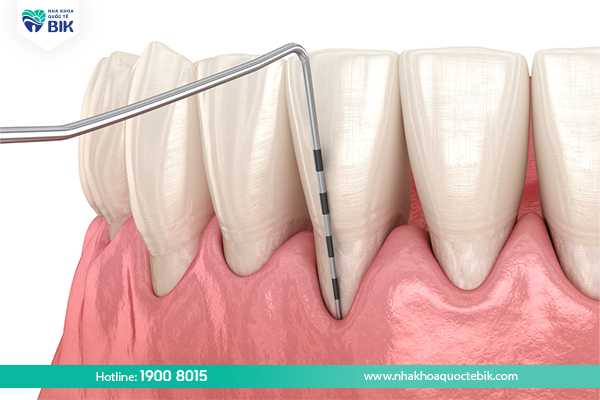
2. What are the causes of gum recession?
Gingival recession can be caused by the following reasons:
2.1. Due to oral hygiene
Infrequent and improper oral hygiene causes food plaque to accumulate in the oral cavity for a long time and then calcify into tartar. These tartar plaques often exist between the tooth root and the gum, from here bacteria will have more favorable opportunities to attack and cause gum recession.

2.2. Due to other diseases
Some diseases such as gingivitis and periodontitis, if not treated promptly, the gums will gradually weaken due to long-term inflammation. From there, the gums will separate from the tooth roots and the teeth will also become loose.
2.3. Due to hormonal changes
In addition, hormonal changes can also be the cause of gum recession. This can be simply understood as a condition in which the biochemical environment in the body changes abnormally, which can be easily seen in pregnant women or in menopause, premenopause, etc. At this time, hormones in the body will change significantly, making the gum tissue more sensitive and easily attacked by harmful bacteria.
3. Can gum recession heal on its own?
Accordingly, many people wonder if gum recession can heal on its own. Specialists advise that gum recession cannot heal on its own because the gums cannot regenerate as before.
In mild cases of gum recession, you only need to practice proper oral hygiene and pay attention to adjusting your diet, as well as taking anti-inflammatory drugs as prescribed by your doctor. However, in cases where gum recession progresses to a serious stage, with too much exposed tooth root, the patient should go to a reputable dental facility for definitive treatment.
4. The most effective treatment method for gum recession
At each different stage of gum recession, the doctor will prescribe an appropriate treatment plan to ensure the best results:
4.1. Treatment in the mild stage
In the early stages, gum recession does not cause too much impact on the patient’s health and has a fairly low level of complexity. At this time, the tooth may appear slightly longer from the outside, with gingivitis, but the patient does not feel really uncomfortable.
At this stage, the doctor will simply perform scaling to remove the living environment of bacteria, preventing gum damage. In addition, the patient needs to coordinate proper oral hygiene with a suitable diet at home to quickly stop gum recession.
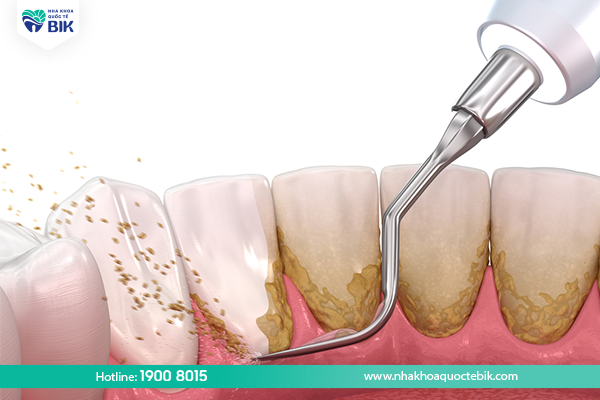
4.2. Treatment in the development stage
At this stage, the gums recede quite a bit, which means that the tooth roots will be more exposed, accompanied by a feeling of pain and discomfort during chewing or oral hygiene. In addition, you will notice that the tooth roots are clearly eroded.
At this time, the doctor will first scrape the teeth to remove harmful bacteria and then give the patient fluoride or perform tooth filling to prevent bacterial attacks.
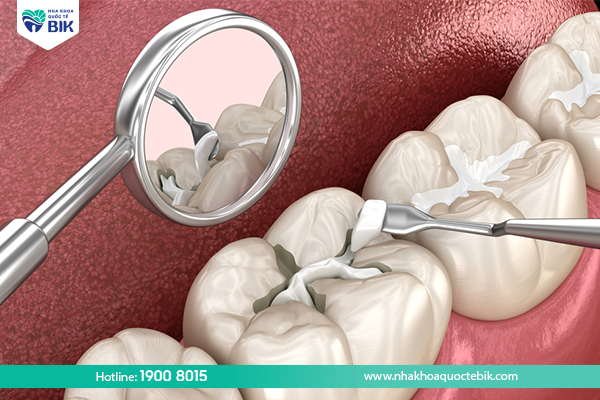
4.3. Treatment in severe stages
When gum recession becomes severe, occurring in many teeth, the tooth roots are exposed and the gums are severely inflamed and red, in addition to removing tartar, the best way is to treat surgically with one of the following three methods:
– Surgery using a local flap with a feeding root to correct gum recession, smaller methods are double papilla flap, semi-lunar flap, lateral sliding flap, oblique flap, sliding flap towards the tooth neck, etc.
– Surgery using autologous tissue grafts, using tissue from a part of the mouth to compensate for the receding gums, divided into smaller methods: subepithelial connective tissue graft, autologous free gum graft, etc.
– Surgery using artificial membranes combined with local flaps: tissue regeneration, using acellular synchronous epithelium, etc.
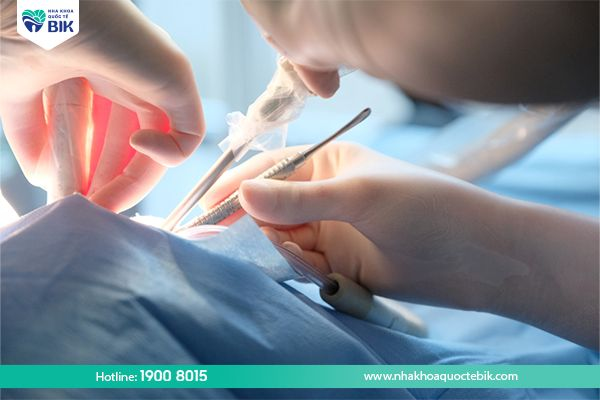
5. Oral care to prevent gum recession
To prevent and limit gum recession, you should note the following:
5.1. Proper oral hygiene
– Brush your teeth with a soft-bristled toothbrush at least twice a day, especially after each meal, to ensure plaque is removed from your teeth.
– Remember to change your toothbrush every 3-4 months to prevent bacteria from growing.
– Use a suitable toothpaste to prevent gum irritation.
– Combine using dental floss to completely remove food debris in between teeth to prevent tartar formation.
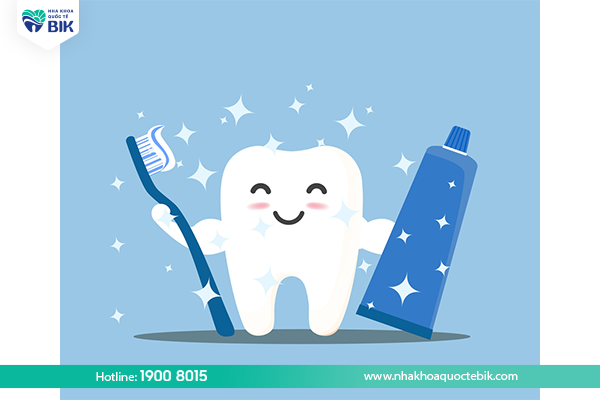
5.2. Reasonable diet
You should note to limit sour foods such as orange juice, lemon juice, yogurt or carbonated soft drinks,… because they will increase tooth sensitivity. In addition, the high acidity in these foods also causes tooth enamel to erode. In addition, foods high in sugar and starch are also not recommended because they easily remain in the oral cavity and turn into tartar.
In particular, absolutely stay away from alcohol and tobacco because they can easily irritate the gums and cause teeth to become yellow and dull, causing loss of aesthetics.

5.3. Regular check-ups
In addition, you should visit the dentist every 6 months for a check-up to remove tartar, remove the living environment of bacteria and get a general check-up to promptly detect and treat any oral problems if any.
So, can receding gums heal on their own? The answer from experts from BIK International Dental Clinic is no. As soon as you discover that your gums are separating from your teeth, you should go to the dentist for an examination to find the specific cause and then proceed with thorough treatment to avoid serious complications later.


















